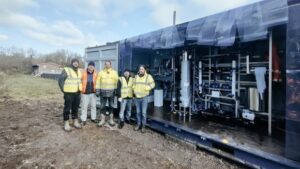Cost-cutting wastewater project could slash greenhouse gas emissions

The project, named OXYHYWATER is in partnership with Dŵr Cymru Welsh Water (DCWW) and could lead to major cuts in greenhouse gas emissions.
OXYHYWATER is a novel form of wastewater treatment being developed by the USW-based Sustainable Environment Research Centre (SERC), which uses pure oxygen, rather than air from the atmosphere, to treat the effluent.
Initial findings are showing that the project has numerous environmental benefits.
“By using pure oxygen to treat the wastewater, the costs of the process when compared to that of using air from the atmosphere,” said Professor Alan Guwy, head of SERC and project lead.
“Using pure oxygen also means that the amount of secondary biomass generated by the system is much smaller than in traditional wastewater treatments, which reduces the cost and energy requirements of secondary waste treatment.
“Emissions of greenhouse gases such as nitrous oxide – which can be emitted during conventional wastewater treatment, with a global warming potential around 300 times greater than carbon dioxide - should also be much reduced in the OXYHYWATER process due to its enclosed design and the use of pure oxygen.”
The production of the oxygen used by OXYHYWATER is a byproduct from the production of hydrogen from electrolysis, another environmentally friendly initiative.
“By implementing OXYHYWATER, the water industry could produce the pure oxygen through electrolysis – a process which uses electricity to split water into hydrogen and oxygen, with the hydrogen used for zero-carbon transport fuel and energy storage, and the oxygen, which would usually be discarded in the atmosphere, used by OXYHYWATER,” added Dr Jaime Massanet-Nicolau, associate professor of bio-based chemical production, and co-investigator on the project.
“There are also further green benefits as the water industry, an intensive user of energy, has both an abundance of renewable energy and water to make hydrogen where 10-11 litres of water are needed to produce a kilogramme of gas.”















